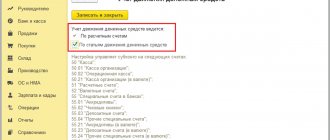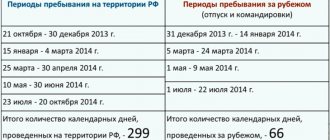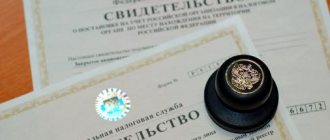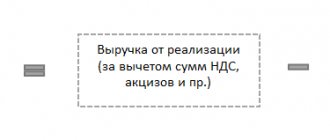Individual entrepreneur – VAT
In accordance with paragraph 1 of stat. 163 of the Tax Code, an individual entrepreneur is a VAT payer on the same basis as ordinary enterprises. That is, value added tax is equally applied by both individual entrepreneurs and legal entities when selling goods or services. For example, if the cost of a product is 100 rubles, upon sale it is necessary to add VAT on top at a rate of 18 or 10%, depending on what exactly the entrepreneur sells (produces) (stat. 164).
Taxation of individual entrepreneurs with VAT depends on what regime the business is in. Some special tax systems provide entrepreneurs with the opportunity to legally reduce the fiscal burden by replacing a number of taxes with the payment of a single one, levied under UTII, simplified tax system, unified agricultural tax or patent. Let's consider whether the individual entrepreneur pays VAT under the simplified tax system or other special tax regimes.
VAT for individual entrepreneurs under the simplified tax system
According to paragraph 3 of Art. 346.11 all entrepreneurs using the simplification are exempt from the obligation to pay VAT. The same applies to those businessmen who work on imputation (clause 4 of stat. 346.26), patent (clause 11 of stat. 346.43), agricultural tax (clause 3 of stat. 346.1). However, this statement is true in general cases, but some individual situations require the calculation and payment of value added tax even by entrepreneurs. In particular, VAT for individual entrepreneurs on simplified and other special regimes arises when:
- Import of products.
- Issuing an invoice to your customers with the allocated tax amount.
- Payment of rental services to owners of municipal or state property.
- Carrying out business transactions under agreements of joint activity, simple partnership, trust management and others according to Stat. 174.1.
- In a number of other cases, in accordance with legislative norms.
Article 346.11 of the Tax Code of the Russian Federation. General provisions (current version)
thirdly, VAT. An exception is VAT payable in accordance with the Tax Code of the Russian Federation when importing goods into the territory of the Russian Federation and other territories under its jurisdiction, as well as value added tax paid in accordance with Article 174.1 of the Tax Code of the Russian Federation.
Official position.
Letter from the Ministry of Finance of Russia dated 04/18/2014 N 03-11-11/18039 draws attention to the fact that no changes were made to the legislation of the Russian Federation on taxes and fees to provide for the obligation of an individual entrepreneur to pay property tax for individuals when applying special tax regimes.
Current problem.
Today, in practice, the question of taxation of the tax paid when applying the simplified taxation system and the personal income tax of the income of an arbitration manager registered as an individual entrepreneur very often arises. This issue very often becomes the subject of consideration by arbitration courts, and there are also many explanations from official bodies on this issue.
Official position.
Thus, in the letter of the Ministry of Finance of Russia dated 03.03.2014 N 03-11-11/8830, the issue of taxation with taxes paid when applying the simplified taxation system and personal income tax of the income of an arbitration manager registered as an individual entrepreneur was considered. On this issue, the Russian Ministry of Finance gave the following explanations.
According to paragraph 1 of Article 20 of the Federal Law of October 26, 2002 N 127-FZ “On Insolvency (Bankruptcy),” an arbitration manager is recognized as a citizen of the Russian Federation who is a member of one of the self-regulatory organizations of arbitration managers. The arbitration manager is a subject of professional activity and carries out professional activities regulated by Federal Law, engaging in private practice. The arbitration manager has the right to engage in other types of professional activities and entrepreneurial activities, provided that such activities do not affect the proper performance of his duties established by bankruptcy legislation.
This norm distinguishes between the professional activities of arbitration managers and entrepreneurial activities, thereby indicating that the activities of arbitration managers regulated by bankruptcy legislation are not entrepreneurial activities. At the same time, the activities of the arbitration manager in a bankruptcy case do not require registration as an individual entrepreneur. Taking into account the above, if a citizen is registered as an individual entrepreneur and does not carry out other activities other than those regulated by Federal Law, then he does not have the right to apply the simplified taxation system.
Consequently, the income of an arbitration manager received from activities as an arbitration manager is subject to personal income tax in the manner established by Chapter 23 “Individual Income Tax” of the Tax Code of the Russian Federation.
If a citizen who is an arbitration manager also carries out entrepreneurial activity, then in relation to the specified entrepreneurial activity he can apply a simplified taxation system in the manner generally established by Chapter 26.2 of the Tax Code of the Russian Federation.
Important!
A similar position has also developed in the judicial practice of arbitration courts. Let's look at a specific example.
Arbitrage practice.
Thus, by Resolution of the Federal Antimonopoly Service of the Central District dated August 14, 2013 N A09-5686/2012, it was refused to satisfy the applicant’s demands to invalidate the tax authority’s decision to suspend transactions on the entrepreneur’s accounts and electronic money transfers.
The FAS of the Central District explained that the Tax Code of the Russian Federation has defined an exhaustive list of conditions under which the possibility of applying the simplified tax system is lost. There is no prohibition on the use of the simplified tax system for arbitration managers when conducting bankruptcy procedures and receiving appropriate remuneration. Since the concept of “arbitration manager” is not defined by the Tax Code of the Russian Federation, it is not considered in the Tax Code of the Russian Federation as a separate category of taxpayers.
The court also found unlawful the tax authority’s reference to the insolvency administrator’s lack of obligation to register as an individual entrepreneur, which cannot be taken into account, since the absence of such an obligation does not deprive the insolvency administrator of the right to do so.
Important!
Thus, based on the analysis of the norms of the Tax Code of the Russian Federation, explanations of official bodies and the established practice of arbitration courts, it follows that the current legislation does not prohibit the use of a simplified taxation system by arbitration managers who are entrepreneurs when conducting bankruptcy procedures and receiving appropriate remuneration.
From January 1, 2010, the provision according to which previously an entrepreneur applying the simplified tax system was obliged to pay insurance premiums for compulsory pension insurance in accordance with the legislation of the Russian Federation became no longer in force.
Paragraph 3 of paragraph 3 of Article 346.11 of the Tax Code of the Russian Federation regulates that other taxes are payable by an individual entrepreneur applying the simplified tax system according to the rules established by the Tax Code of the Russian Federation.
Paragraph 4 of the commented article establishes a very important provision, according to which for organizations and individual entrepreneurs applying the simplified taxation system, the current procedure for conducting cash transactions and the procedure for submitting statistical reporting are preserved. Please note that the procedure for providing primary statistical data and administrative data to subjects of official statistical accounting is regulated by Article 8 of the Federal Law of November 29, 2007 N 282-FZ “On official statistical accounting and the system of state statistics in the Russian Federation” (hereinafter referred to as Law N 282-FZ ).
It is also necessary to follow the Procedure for making cash payments and (or) payments using payment cards without the use of cash register equipment, approved by Decree of the Government of the Russian Federation dated May 6, 2008 N 359.
Important!
It is also necessary to note that from June 1, 2014, new rules for conducting cash transactions are in force in connection with the entry into force of the Bank of Russia directive dated March 11, 2014 N 3210-U “On the procedure for conducting cash transactions by legal entities and the simplified procedure for conducting cash transactions by individual entrepreneurs and small businesses." Let us recall that previously there was a Regulation on the procedure for conducting cash transactions with banknotes and coins of the Bank of Russia on the territory of the Russian Federation, approved by the Bank of Russia on October 12, 2011 N 373-P.
Official work.
In letter of the Ministry of Finance of Russia dated October 30, 2013 N 03-11-11/46198, in order to apply paragraph 4 of Article 346.11 of the Tax Code of the Russian Federation, the issue of the need for a taxpayer applying the simplified tax system with the object of taxation in the form of “income” to document the sending of employees on a business trip and confirm expenses for travel of employees, their accommodation in a hotel, payment of daily allowances, and other expenses. On this issue, the Russian Ministry of Finance indicated the following.
The accountable person is obliged, within a period not exceeding three working days after the expiration date for which cash was issued on account, or from the date of return to work, to present to the chief accountant or accountant, and in their absence, to the manager, an advance report with attached supporting documents. Checking the advance report by the chief accountant or accountant, and in their absence - by the manager, its approval by the manager and the final settlement of the advance report are carried out within the period established by the manager.
Organizations or individual entrepreneurs using a simplified taxation system with the object of taxation in the form of income, the preparation of documents confirming the sending of employees on business trips, and the above-mentioned expenses incurred by them on business trips, as well as advance reports, must be carried out in the generally established manner.
Paragraph 5 of Article 346.11 of the Tax Code of the Russian Federation establishes that individual entrepreneurs and organizations using the simplified tax system continue to perform the functions and responsibilities of tax agents.
In accordance with paragraph 1 of Article 24 of the Tax Code of the Russian Federation, tax agents are persons who, in accordance with the Tax Code of the Russian Federation, are entrusted with the responsibility for calculating, withholding from the taxpayer and transferring taxes to the budget system of the Russian Federation.
Current problem.
In practice, the question may arise as to whether an individual entrepreneur or organization applying the simplified tax system performs the functions of a tax agent when applying international law. Please note that paragraph 5 of Article 346.11 of the Tax Code of the Russian Federation is subject to a broad interpretation, therefore, in the situation under consideration, they are also responsible for performing the functions of tax agents. To substantiate this argument, consider the position of the official bodies.
Official position.
Thus, in the letter of the Federal Tax Service of Russia dated October 25, 2013 N OA-4-13/ [email protected] it is explained that when applying the provisions of international treaties of the Russian Federation, the tax agent is not relieved of the obligation to submit tax calculations to the tax authorities at the end of the reporting (tax) period ( information) on the amounts of income paid to foreign organizations and taxes withheld.
Official position.
In the letter of the Federal Tax Service of the Russian Federation dated May 17, 2011 N AS-4-3/ [email protected] “On the procedure for fulfilling the duties of a tax agent by a taxpayer-organization applying the simplified tax system”, the following explanation is given on the application of the provisions of paragraph 5 of the commented article based on a specific example.
In the case where the founders of a legal entity are only individuals, the amounts of dividends due to them are subject to personal income tax. Accordingly, the organization that is the source of payment of dividends, applying the simplified taxation system, has obligations to withhold and pay corporate income tax and submit to the tax authorities a calculation for this tax or to fill out any sections (sheets) of the tax return for corporate income tax also does not arise.
Despite the fact that this clarification was given by the Federal Tax Service of Russia back in 2011, it remains relevant today, since the legal regulation of the situation under consideration has not changed, and no amendments have been made to paragraph 5 of Article 346.11 of the Tax Code of the Russian Federation.
Important!
For failure to fulfill the duty of a tax agent, taxpayers applying the simplified tax system are held liable under Article 119 of the Tax Code of the Russian Federation, which is confirmed by the position of the courts (see, for example, Determination of the Supreme Arbitration Court of the Russian Federation dated March 21, 2014 N VAS-2475/14).
VAT for individual entrepreneurs under OSNO
When conducting commercial activities under the general regime, all entrepreneurs are considered VAT payers. In practice, this means that individual entrepreneurs will have to issue invoices, fill out a declaration and pay taxes to the budget. At the same time, OSNO automatically arises for those individual entrepreneurs who have not submitted an application to switch to one or another special regime; have lost the right to use it or are conducting several types of activities, including on the common system.
Exemption from VAT for individual entrepreneurs on OSNO is possible in the following situations:
- If an individual entrepreneur carries out non-taxable transactions, the declaration is submitted with the formation of section. 7.
- If an individual entrepreneur is exempt from the obligation to calculate VAT according to stat. 145 – reporting is not required to be submitted to the Federal Tax Service.
Who is exempt from paying VAT under Art. 145 Tax Code of the Russian Federation
Let's start with the fact that the VAT exemption obtained in accordance with Art.
145 of the Tax Code of the Russian Federation, applies to all activities of the taxpayer, and not to certain types of business or operations. At the same time, it does not exempt from payment of import and agency VAT (clause 3 of Article 145, Article 161 of the Tax Code of the Russian Federation). Both organizations and individual entrepreneurs can receive VAT exemption. The main thing is that the following condition is met: the amount of revenue from the sale of goods and equipment (excluding VAT) for the 3 previous consecutive calendar months should not exceed 2 million rubles. (clause 1 of article 145 of the Tax Code of the Russian Federation).
NOTE! The calculation must include revenue only from transactions subject to VAT (letter of the Federal Tax Service of Russia dated May 12, 2014 No. GD-4-3/ [email protected] , Resolution of the Presidium of the Supreme Arbitration Court of the Russian Federation dated November 27, 2012 No. 10252/12).
Not entitled to receive exemption from VAT (clause 2 of Article 145 of the Tax Code of the Russian Federation):
- persons selling excisable goods;
- organizations that are exempt from VAT as participants in the Skolkovo project.
Newly created organizations and newly registered individual entrepreneurs can also apply for exemption during the first three months of work, when they do not yet have 3 months of revenue (see letter of the Ministry of Finance dated August 23, 2019 No. 03-07-14/64961).
Individual entrepreneur for VAT - what reports to submit
The main type of reporting for individual entrepreneurs for VAT is a tax return. The form is submitted for tax periods, which are set to one quarter (Article 163). The method of presentation is electronic. The deadline for submission is the 25th day of the month following the reporting month. Is there a zero VAT return for individual entrepreneurs? This is possible if the entrepreneur is a VAT payer, but for some reason did not conduct business. In this case, the individual entrepreneur is required to submit profit reports, as well as value added tax, to the control authorities in order to avoid fines for failure to submit declarations.







